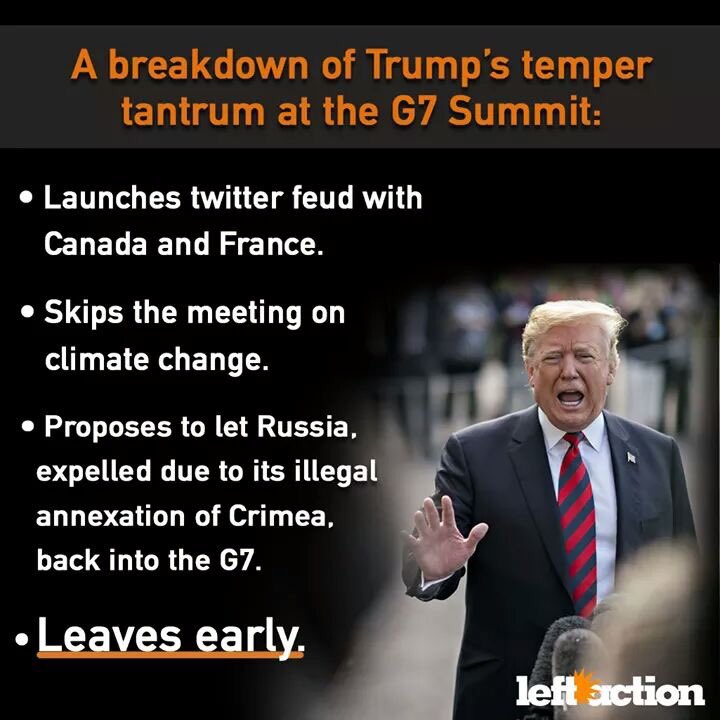Trump throws G7, insults allies, bolsters Russia and makes a quick getaway
By Terry H. Schwadron, DCReport New York
Editor
 As disrupter-in-chief, this is the week that Donald Trump has
turned the U.S. presidency into a remarkable weapon.
As disrupter-in-chief, this is the week that Donald Trump has
turned the U.S. presidency into a remarkable weapon.
With his unique deftness, Trump has managed to all-but-split the
American alliance with Europe, pinned his hopes on reaching an unprepared-for
agreement with an untrustworthy North Korea, has offended the European allies,
already off-put by tariff policy, by calling for Russia to be reinstated to the
G-7 group.
Trump spurned two days of global economic diplomacy late Saturday by
refusing to sign a joint statement with America’s allies, threatening to
escalate his trade war on the country’s neighbors and deriding Canada’s prime
minister as “very dishonest and weak.”
Just moments after a closing communiqué was read aloud, Trump
blasted it from Air Force One, already on route to the Singapore summit with
North Korea.
With specific tariffs and trade substituting for security, Trump
has cut ties with long-time allies in Canada, Mexico and Europe.
Trump is doing all this with a White House team that is split, a
Congress that is seething at him, and an American public that is about as
deeply divided as ever recorded.
If there had been a provable, intentional campaign from Russia
for the election of a candidate who could ruin traditional American strengths
and replace them with a dissenting, argumentative, untethered American
isolation, you might credit Vladimir Putin with having achieved his wildest
dreams.
 |
| Well, not so much smiling |
“The result was a slow-rolling collapse of the fragile alliances
that officials at the summit—and even Mr. Trump’s own White House
advisers—insisted throughout the day could be maintained in the face of fundamental
disagreements,” said the New York Times.
As The Washington Post editorial yesterday noted,
“Trump’s decision to sow ferment within the G-7—to antagonize America’s closest
allies—is more than a childish tantrum or a play for attention.
It is an undermining of those values that the G-7 was meant to
safeguard. Not only the allies, but Americans, too, must come to grips with the
fact that the ostensible leader of the free world may not really believe either
in the free world or in leading it.”
Whatever else results, the outcome, for now, seems inevitable.
America First has become America Alone.
The joke at the allies’ meeting in Canada this weekend was that
the group has become the G-6 plus 1, the United States. It helps no one
anywhere for Europe to feel as if it has been spurned by the United States.
 Meanwhile, the picture (left) of Chinese Premier Xi Jinping meeting
with Putin in China seemed to take on disproportionate importance.
Meanwhile, the picture (left) of Chinese Premier Xi Jinping meeting
with Putin in China seemed to take on disproportionate importance. Those two countries are clearly on the rising influence scale, while Trump is pointing us in a different direction.
Let’s remember that the G-7 meetings began among Britain,
Germany, France, Italy, Canada and Japan 40 years ago to look for points of
economic and security commonality, preventing precisely the sorts of trade
issues that President Trump is now inflaming.
The New York Times’ Peter Baker noted that
Trump’s “role as a disrupter on the world stage [has never] been starker. At a
moment of tumult over trade and nuclear security, he is shaking up the
international order to make friends with America’s enemies and enemies out of
America’s friends.”
After a year of being restrained to some extent by advisers who
championed that global order, Trump has replaced much of his national security
team with more like-minded aides and is finally acting on his “America First”
impulses in ways that are sending shock waves across Europe, Asia and North
America.
Even the leader of the engagement strategy, President Emmanuel
Macron of France, seems to have given up, publicly expressing deep frustration
with Mr. Trump and warning that the United States will isolate itself, Baker
noted.
Trump said that he brought up with America’s closest allies the
dramatic prospect of completely eliminating tariffs on goods and services, even
as he threatened to end all trade with his counterparts if they do not stop
what he says are unfair trade practices.
On top of all of his tariffs talk, Trump arrived late, and left
early, to set off in search of a totally undefined negotiation with North
Korea’s Kim Jong-Un.
In calling for Russia to be re-admitted to the group of western
democracies, Trump offered no reason. He has ignored the fact that Russia was
expelled over invading Ukraine and seizing portions of the Crimean Peninsula.
In Washington, lawmakers of both parties were either aghast or
chose to ignore Mr. Trump’s suggestion on the assumption that it was yet
another offhand remark just to stir the pot, not a serious initiative.
Trump’s advocacy for Russian membership in the Group of 7 was in keeping with his against-the-grain attitude toward Moscow. He has repeatedly spoken in flattering terms about Mr. Putin and pushed for closer ties.
Trump’s advocacy for Russian membership in the Group of 7 was in keeping with his against-the-grain attitude toward Moscow. He has repeatedly spoken in flattering terms about Mr. Putin and pushed for closer ties.
The campaign for disruption is on at home too, of course, with
continuing effort to overturn health care protections, consumer protection,
environmental regulation, education support, labor protections, even free
speech flare-ups.
Maybe the reliance on disruption explains exactly why there is a
depth in Trump electoral support: It is tons easier to say the hell with it all
than to try to build systems that work. In the end, however, this will not
prove helpful to the world or to this country.
